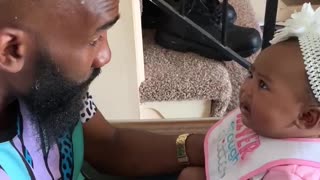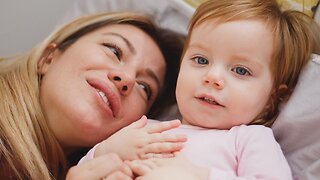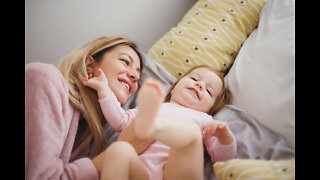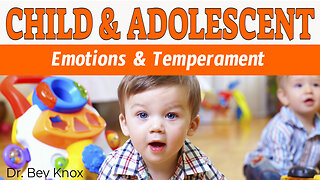Mom Guilt + Secure Attachment with Your Baby
A casual conversation addressing mom guilt that plagues us and my initial thoughts on building secure attachment with our babies. Secure attachment is important because it is foundational in building an emotionally healthy human. But what does it look like to do it?
Check out our new store at:
http://www.verygoodmothersclub.com
@verygoodmothersclub
See you on instagram!
@jess_hover
__________________
Baby Products you might like:
Swaddles:
muslin swaddle: https://bit.ly/2GPOIOu
Baby Clothes:
Mebie Baby (Double zipper/zips from the bottom): https://bit.ly/315DwE3
Pacifiers:
Pacifier: https://bit.ly/3gNuQur
Clip: https://bit.ly/2SRkPzJ
Diapers, Wipes & Shampoo:
Hello Bello Diapers ($15 OFF): https://hellobello.com/?smile_ref=eyJ...
Car seat:
Uppa Baby Mesa: https://amzn.to/2RnwyWP
Winter seat cover: https://amzn.to/2TUl1Q7
Nursing Spot:
Rocking Chair: https://amzn.to/2P0PKcb
Boppy Pillow: https://amzn.to/3aBJAY8
Nursing Bra: https://bit.ly/2H75AQA
Place for the baby to hang out:
Swing: https://amzn.to/30LYs1I
Bouncer: https://amzn.to/36mnJAH
Snuggle Me Organics Lounger: https://bit.ly/340ZIkV
Baby Bed:
Snoo: https://amzn.to/2tK8Ri8
More affordable bassinet: https://amzn.to/36idhKl
Bottles:
Dr. Browns: https://amzn.to/36fNVNm
Como Tomo: https://amzn.to/2GfeNT8
Breast Pump:
Haakaa: https://amzn.to/2uwlxZW
Portable Electric Pump: https://amzn.to/36qHQNX
Cheaper Electric Pump: https://amzn.to/2usof2V
Baby Monitor:
Owlet (Wifi camera): https://amzn.to/37nNl1h
Eufy: https://amzn.to/2Y1mr
Nanit: https://amzn.to/2vkI9xb
Baby Bath: https://amzn.to/2urtbFe
Griper Water: https://amzn.to/2NVtX3Z
Stroller: https://amzn.to/2RkSxgY
Carriers:
Ergo 360 baby carrier: https://amzn.to/2OJMwc
Ring Sling: https://amzn.to/2MILDhT
Swado swaddle: https://amzn.to/2rUYd6Q
Halo sleep sack: https://amzn.to/2rR4fWe
Zipadeezip: https://amzn.to/365jhqp
Portable Sound Machine: https://bit.ly/3rl3teW
Baby Toys: KiwiCo: https://kiwico.com/jess_hover
https://www.verywellmind.com/attachment-styles-2795344 says this about attachment:
Attachment is a special emotional relationship that involves an exchange of comfort, care, and pleasure. The roots of research on attachment began with Freud's theories about love, but another researcher is usually credited as the father of attachment theory.
John Bowlby devoted extensive research to the concept of attachment, describing it as a "lasting psychological connectedness between human beings."1 Bowlby shared the psychoanalytic view that early experiences in childhood are important for influencing development and behavior later in life.
Our early attachment styles are established in childhood through the infant/caregiver relationship. In addition to this, Bowlby believed that attachment had an evolutionary component; it aids in survival. "The propensity to make strong emotional bonds to particular individuals [is] a basic component of human nature," he explained.
...
Children who are securely attached generally become visibly upset when their caregivers leave and are happy when their parents return. When frightened, these children will seek comfort from the parent or caregiver.
Contact initiated by a parent is readily accepted by securely attached children and they greet the return of a parent with positive behavior. While these children can be comforted to some extent by other people in the absence of a parent or caregiver, they clearly prefer parents to strangers.
Parents of securely attached children tend to play more with their children. Additionally, these parents react more quickly to their children's needs and are generally more responsive to their children than the parents of insecurely attached children.
Studies have shown that securely attached children are more empathetic during later stages of childhood.5 These children are also described as less disruptive, less aggressive, and more mature than children with ambivalent or avoidant attachment styles.
While forming a secure attachment with caregivers is normal and expected, as Hazan and Shaver have noted, it doesn't always happen. Researchers have found a number of different factors that contribute to the development (or lack thereof) of secure attachment, particularly a mother's responsiveness to her infant's needs during the first year of a child's life.
Mothers who respond inconsistently or who interfere with a child's activities tend to produce infants who explore less, cry more, and are more anxious. Mothers who consistently reject or ignore their infant's needs tend to produce children who try to avoid contact.
As adults, those who are securely attached tend to have to trust, long-term relationships. Other key characteristics of securely attached individuals include having high self-esteem, enjoying intimate relationships, seeking out social support, and an ability to share feelings with other people.
By Kendra Cherry
Medically reviewed by David Susman, PhD
(read the full article at the link above)
-
 59:46
59:46
DocSnipes
2 years agoAttachment Theory Basic: What Is It and Why Should I care
70 -
 0:47
0:47
Baldhead1988
5 years ago $7.48 earnedDad Successfully Keeps Baby Girl From Crying In Hilarious Fashion
27.9K3 -
 0:27
0:27
SWNS
9 months ago9 in 10 parents admit they’ll never stop worrying about their child’s wellbeing
47 -
 1:05
1:05
SWNS
2 years agoWhy parents have implemented "tummy time" with their babies
35 -
 0:14
0:14
stupid_mom_smart_baby
4 years ago $35.71 earnedFrustrated Baby Hysterically Rage Quits
335K11 -
 26:45
26:45
HarryTheSoulCoachMeditations
9 months agoAttachment; an important Life Important lesson
8 -
 0:17
0:17
Jojomacy
6 years agoBaby Replies To Mom's Questions In Its Own Way
7.82K -
 0:50
0:50
SWNS
2 years agoA third of people find parenting to be more difficult than they expected
14 -
 14:17
14:17
Psychology for Real Life
9 months agoPsychosocial Development in Infants and Toddlers - Emotions, Temperament, and Attachment.
12 -
 0:15
0:15
Roselynn
4 years ago $5.30 earnedNew Dad's Priceless Reaction To Crying Baby Twins
43.9K7